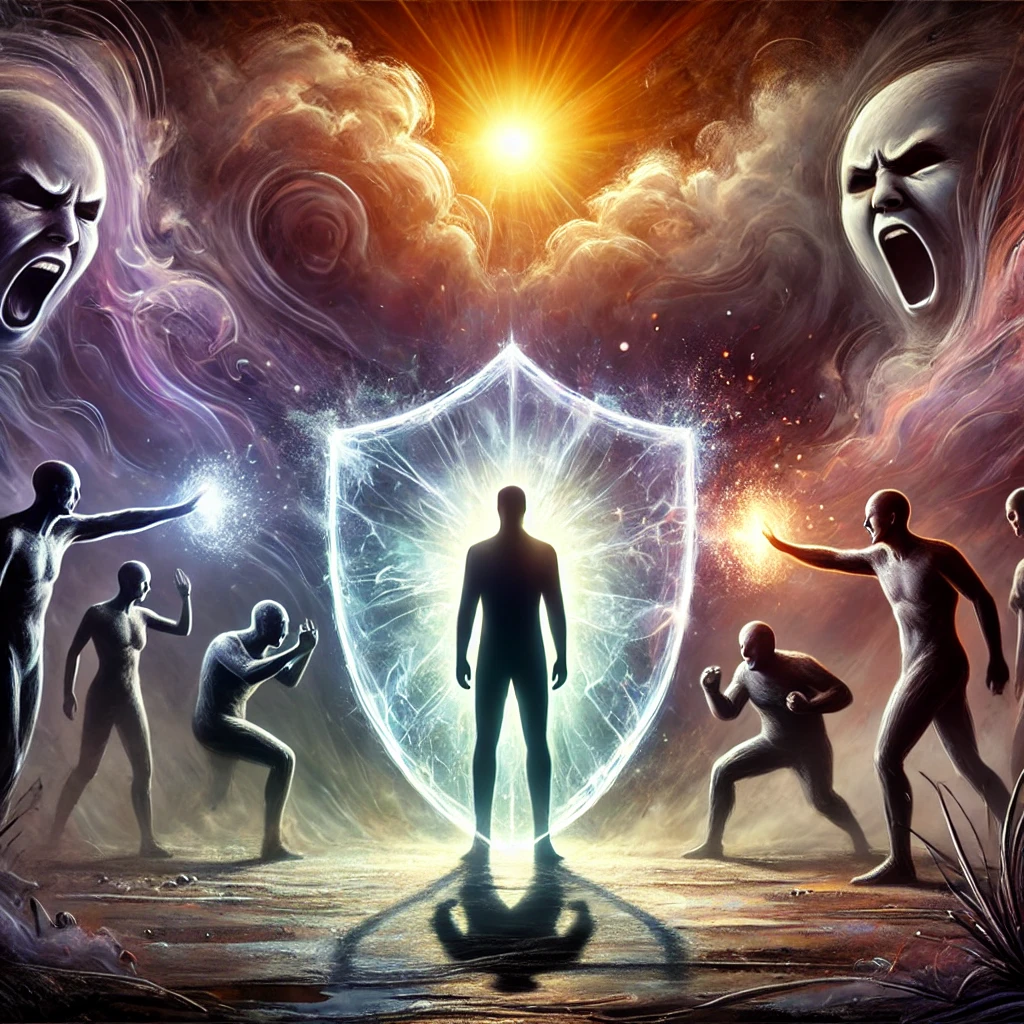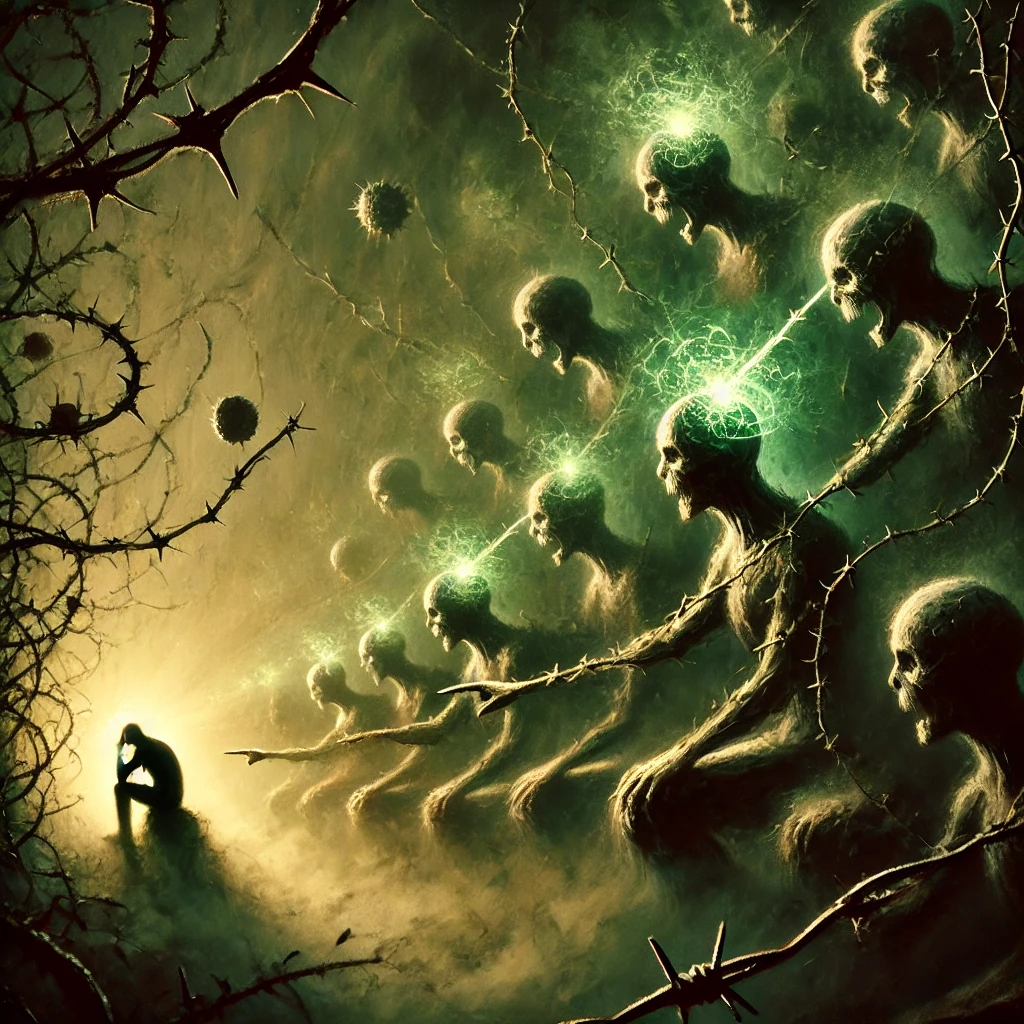Poison in Disguise
There’s a poison coursing through humanity—a toxic mindset many are unaware they carry and most do not care. It’s a venom of judgment, entitlement, and idolatry. It infects families, seeps into relationships, and pollutes society as a whole. This poison is born of past programming: childhood wounds, oppressive societal norms, misguided religious teachings, and unexamined beliefs.
Some wear their poison with pride, projecting it onto others and perpetuating the cycle of harm. Others swallow it quietly, letting it fester within, crippling their spirit. But here’s the truth: this poison doesn’t have to be yours. You can choose to break free from it. You can refuse to own the pain others try to hand you. This blog will challenge you to confront your own poison, to reject the venom of others, and to see the world—and yourself—through a lens of truth and liberation.
Recognizing the Enemy

Let’s start with a truth you might not want to hear: the poison in your life didn’t come from nowhere. It’s not some cosmic curse that randomly landed on you. It was handed down, often by the very people who claimed to love you—your parents, teachers, religious leaders, and society at large.
This poison begins early. Parents, burdened by their own unresolved traumas, unknowingly pass on toxic mindsets to their children. Maybe it’s a father who taught you that strength means never crying. Or a mother who drilled into you that your worth is tied to your appearance. Maybe it’s a school system that valued obedience over curiosity or a religious institution that peddled fear over love.
But here’s the truth: no matter where this poison came from, it’s now your responsibility to deal with it. If you don’t, you will continue the cycle. You will infect your children, your friends, your community.

And let’s not pretend it’s just some passive trait. Poison isn’t quiet. It seeps out of you in judgmental comments, self-righteous attitudes, gossip, and emotional manipulation. You project your pain onto others, lashing out because it’s easier than looking inward.
Emotional Projection: Stop Spreading the Poison

Why is it so easy to lash out at others? Because confronting your own pain requires courage, and let’s face it, courage isn’t exactly abundant these days. Instead of doing the hard work of self-reflection, people vomit their emotional poison onto others.
Think about it: How often do you criticize someone else as a way to deflect your own insecurities? How often do you gossip because you can’t face your own failures? Every time you spread your poison, you’re not just harming others—you’re cementing your own misery.
Stop blaming your past. Stop blaming society. If you’re an adult, it’s time to own up. Your poison is your responsibility. Are you not tired of your own bullshit?
The Misunderstood Jesus: Idol Worship and Hypocrisy
Nowhere is this poison more evident than in how people have twisted the teachings of figures like Jesus. Let’s get something straight: Jesus was not your personal mascot for judgment and entitlement.
In his time, Jesus was a radical, a heretic, a voice that made people uncomfortable because he spoke truth. He didn’t come to uphold the status quo or pat people on the back for their hypocrisy. He came to challenge power, ego, and corruption. And they killed him for it!

And yet, what do we see today? A distorted version of Jesus, neatly packaged to fit people’s comfort zones. A whitewashed idol hung on a wall, used as a weapon to judge others and justify self-righteousness. This isn’t faith—it’s poison at it’s best!
If you truly understood Jesus’ message, you wouldn’t be spreading hatred, entitlement, or judgment in his name. You wouldn’t be using religion as a shield for your poison. Wake up. Jesus isn’t coming back to save you from the mess you’ve created. He already came, delivered the message, and left. It’s up to you to live it. Let’s learn more about what the bible says.
The Parable of the Wedding Feast: A Lesson in True Worth

Jesus often spoke in parables, delivering profound truths in stories that forced people to confront their own values and actions. One of his most striking parables is the story of the king who prepared a grand wedding feast and sent his servants to gather guests. The king’s invitation was first extended to the wealthy, the powerful, and the socially significant. Yet, these individuals, blinded by their own self-importance, refused to attend. Some even mistreated the servants who bore the invitation. In response, the king turned away from the entitled elite and opened his banquet to the poor, the lowly, and the outcasts. These were the ones who filled the banquet hall, rejoicing in the opportunity that the so-called important people had scorned.
This parable is a masterclass in humility and the danger of arrogance. The rich and self-righteous were so consumed by their own poison—entitlement, greed, and pride—that they dismissed an incredible opportunity for connection, joy, and honor. They didn’t just reject the invitation; they rejected the chance to rise above their toxic mindsets and embrace something greater than themselves.
On the other hand, the poor and the meek, often overlooked by society, recognized the value of the king’s invitation. They came with gratitude, not entitlement. They didn’t assume they deserved a seat at the table; they accepted it with humility and joy. Let’s read about some examples.
Examples For You and I
Material Judgment: A woman with a large home might look down upon another woman whose house is smaller or less modern. Her subtle comments or dismissive glances create feelings of inadequacy in the other woman, who consumes that poison and passes it down to her children, teaching them to chase material validation instead of self-worth.
Body Image Comparison: A man watching a fitness influencer on YouTube might compare his own physique to the idealized figure on the screen. Instead of appreciating his own body’s unique strengths and capabilities, he fixates on what he lacks, allowing that poison to fuel self-loathing and insecurity.
Parenting Shaming: A parent might criticize another for their child’s behavior, subtly implying they are a failure as a caregiver. The criticized parent internalizes that judgment, becoming more anxious and harsh with their own children, perpetuating a cycle of stress and inadequacy.
Social Media Envy: Someone scrolling through Instagram sees perfectly curated vacation photos or images of a seemingly flawless family. Instead of being inspired or happy for others, they feel lesser, start comparing their life unfavorably, and carry that poison into their relationships, becoming resentful or withdrawn.

Workplace Toxicity: A coworker, jealous of another’s success, spreads rumors or undermines them subtly in meetings. The victim internalizes this poison as self-doubt, hesitating to pursue future opportunities, which can stifle their personal growth and career.
Cultural or Religious Judgment: Someone raised in a strict cultural or religious environment might judge those who live differently, seeing them as immoral or lesser. Their judgment creates division, and the judged person, feeling excluded or unworthy, might either lash out or internalize those feelings, perpetuating a cycle of misunderstanding and hurt.
Peer Competition: A friend downplays another’s achievements or subtly brags about their own success, making the other feel small. This poison spreads through the friendship, creating tension and feelings of inadequacy on both sides.
Breaking the Chains: A Path to Liberation

It’s time to stop owning other people’s poison.
When someone projects their anger, fear, or insecurity onto you, you don’t have to accept it. Their poison is theirs, not yours. Refusing to take it on is the first step to freedom.
But let’s not stop there. You also need to face your own poison. That means digging into the painful truths about yourself—the ways you’ve hurt others, the beliefs you’ve clung to that no longer serve you, the lies you tell yourself to avoid accountability.
Steps to Break Free
- Identify Your Poison: Reflect on the toxic patterns you’ve inherited or created. Write them down. Name them.
- Own It: Stop blaming others. Yes, your parents or society may have started this, but you’re the one keeping it alive.
- Reprogram Your Mind: Challenge the beliefs that no longer serve you. Educate yourself, seek therapy, meditate—do whatever it takes to unlearn the poison.
- Set Boundaries: Stop allowing others to dump their poison on you. It’s not your job to fix them or carry their pain.
- Commit to Growth: This isn’t a one-time fix. Breaking free from poison is a lifelong process.
Awakening to the Message

Here’s the hard truth: the enemy is within. It’s not your boss, your spouse, your parents, or society—it’s the unexamined poison inside you. And until you face it, you will remain a prisoner.
Jesus didn’t tell people to wait for a savior. He told them to wake up. To love radically. To live authentically. If you’re sitting around waiting for someone to fix your life or give you permission to change, you’ve already missed the point. And if you continue to look down upon others, judgment will knock at your door oneday. Let’s be honest—most people in our society don’t practice real Christianity. They package their beliefs into a neat little box, wrapped for show, hoping others will admire it, but it’s hollow and performative. The truth is, it’s not genuine, and chances are, you’re living as a hypocrite.
A Call to Liberation

The world is drowning in poison—judgment, entitlement, hypocrisy, and greed. But it doesn’t have to be this way. The antidote begins with you, today this very moment in time!
Refuse to carry the poison others try to give you. Stop spreading your own poison to those around you. Confront the lies and toxic beliefs that have shaped your life, and choose a different path.
The choice is yours. Will you break the chain? Will you face the enemy within? Or will you continue to poison yourself, your loved ones, and the world?

In my house, we stand ready to confront the enemy.
The time for change is now. Wake up and get to work!
Let’s reclaim what is rightfully our’s in this digital noise we live in. Join us in this exploration of how deep the rabbit hole actually goes.

No responses yet